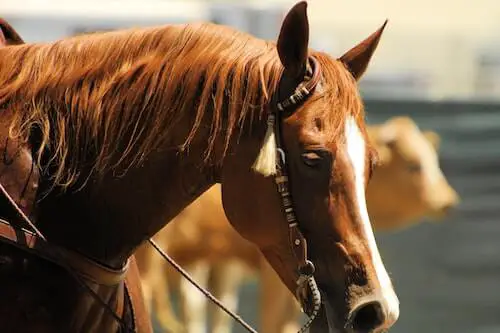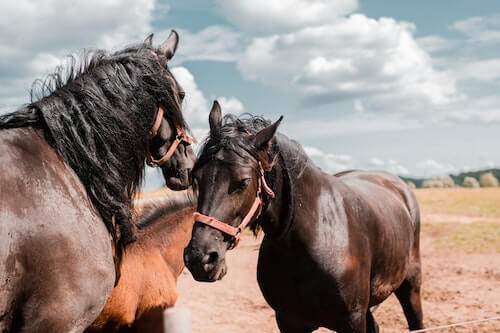If you are a horse owner, you may have noticed that your horse’s coat is looking a little thin lately. You may also have noticed bald spots or areas where the hair is starting to come out in clumps. While this can be alarming, there are many possible causes for hair loss in horses and it is important to determine the cause before taking any steps to remedy it.
Let’s take a look at some of the most common causes of hair loss in horses.
Allergies/Insect Bites
One of the most common reasons for hair loss in horses is allergies or insect bites. Horses can develop allergies to different types of grasses, hay, bedding materials, medications, and other environmental factors.

When they come into contact with an allergen, their bodies react by producing histamines which can cause inflammation and itching which can lead to hair loss. Insect bites can also cause itching and inflammation which then leads to hair loss.
If you think your horse might be allergic or has been bitten by an insect, talk to your veterinarian as soon as possible so they can diagnose and treat the problem quickly.
Nutritional Deficiencies
Another possible cause of hair loss in horses is nutritional deficiencies. Horses require specific nutrients in their diet in order to stay healthy and maintain their coats of fur.
Without these essential nutrients, their coats will become dull and brittle over time which can lead to patches of baldness or complete hair loss.
Make sure that you are feeding your horse adequate amounts of high-quality hay and grain as well as providing them with access to fresh water on a daily basis in order to prevent nutritional deficiencies from occurring.
Hormone Imbalances
Hormone imbalances can also lead to hair loss in horses due to changes in the production of certain hormones like estrogen and testosterone that regulate fur production and growth.

Hormonal imbalances can be caused by stress or diseases such as Cushing’s Disease so it’s important that you monitor your horse closely if they show signs of hormonal imbalance such as weight gain or muscle atrophy so that you can seek treatment right away if necessary.
When Is Horse Hair Loss Normal?
The most common cause of hair loss in horses is seasonal shedding. This usually occurs twice a year when the days get shorter and the temperatures get colder. During this time, horses will naturally shed their coats and replace them with thicker winter coats to protect them from the elements.
During this process, you may notice tufts of hair around your horse’s stall or pasture – this is perfectly normal and nothing to be overly concerned about.
If you notice that horse is exhibiting signs of excessive hair loss that isn’t related to seasonal shedding or an injury, then it may point to an underlying medical condition that requires veterinary attention.
Treating Hair Loss
Once you know what is causing the hair loss, it should be fairly easy to begin treating it.
Parasites can usually be treated with medicated shampoos or powders that kill off any bugs on the coat while also helping promote healthy new growth of fur. Fungal growths may require topical ointments or oral medications in order to eliminate them completely from your horse’s skin and coat.

Skin allergies may need special shampoos formulated specifically for sensitive skin while bacterial infections will likely require antibiotics administered via injection or orally over a period of time until they are completely gone.
Poor nutrition or hormonal imbalances often require dietary changes as well as supplements to help improve overall health and restore fullness to the coat of fur again over time.
Final Thoughts
If you’re worried because your horse is starting to lose its coat, don’t be. There are many possible explanations, including allergies or bites from insects all the way to hormonal imbalances and nutritional deficiencies.
It’s important that you take steps right away to determine the underlying cause of the hair loss so that you can provide the best care for your beloved equine companion.
Talk with your vet about potential causes and treatment options so that you get back on track quickly with optimal health for your horse.
